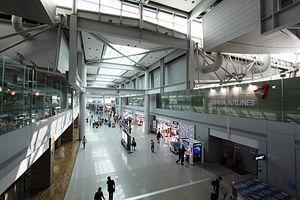New numbers released by the Korean government show that South Korea’s birth rate has officially fallen below one baby born per woman, meaning that Korea’s population problem is only going to get worse. But while the Korean government struggles to encourage its people to have more babies, it is simultaneously trying to figure out how to take care of the country’s increasingly large population of elderly people as well.
As the government debates policies to help deal with major problems facing the elderly, such as financial and medical support, they are also struggling with questions of the day-to-day quality of life for seniors. One set of issues pertains to the use of public spaces, a small issue that has turned into a very visible manifestation of the larger problems that will plague Korea’s increasingly large elderly population.
Amid the hot, humid Korean summer, Seoul’s elderly have started a new trend – “공캉스” (Gongcance) a new slang word created by combining 공항 (airport) + 바캉스 (vacance, or vacation). In order to stay cool, elderly people have been packing up their lunch and flocking to Korea’s airports and bus terminals, where there is ample seating and the air conditioning is free. According to reports from the airport railway, nearly 3,000 elderly passengers per day traveled to Incheon Airport from August 1 to 11. That’s more than 32,000 passengers in just the early days of August.
Energy costs are a major issue, particularly for the most vulnerable. In Korea, household electricity bills work on a incremental system, meaning that high volume users will pay increasingly high prices to discourage waste. However, even just running an air conditioner for eight hours a day during a particularly hot summer could land you in the top tier, racking up electricity bills of over $200. For the 50 percent of Korea’s elderly living in poverty, such a bill is simply too high to risk turning on the A/C for long, if at all. This can be a major risk, given that the elderly are particularly vulnerable to heat-related health problems.
The Korean government and local authorities have set up tens of thousands of emergency heat shelters providing a place for the public to relax with free A/C, but for those who make the trek out to Incheon or Gimpo airports, there is no comparison. According to some enjoying their airport vacation who were interviewed by the Seoul Shinmun, the airport is less crowded, more comfortable, and is easier to get to by subway than other facilities around Seoul. Because those over the age of 65 can ride the Seoul subway for free, the entire trip costs nothing (this policy itself is controversial, as it costs the Seoul subway nearly 360 billion won ($300 million) per year in lost revenue).
While these airport vacations may be a novel way for vulnerable populations to stay out of the heat, this new trend is not without controversy. As many have pointed out, airports and bus terminals are facilities meant for travelers, not for those who want to rest throughout the day. And with 3,000 additional people using the airport’s facilities, some employees have reportedly said the amount of trash is way up, pointing to those who bring their own lunches and then discard the waste at the airport.
But the number of elderly taking airport vacations is actually down from last year, according to numbers from the airport railroad. According to Newsis, the trend started last summer amid a record-breaking heat wave. At the time visitors created chaos in the terminal, reportedly laying out large mats to nap on, or taking up tables needed by travelers. This year, airport vacationers are apparently deliberately heading to areas that are less open and visible, in order to give a better first impression for visitors arriving in Korea.
While it may be true that the airport is not necessarily meant for thousands of people to spend their days, the Gongcance trend highlights a major gap in public services for Korea’s elderly. Without addressing high electricity costs or providing more convenient public facilities for them to safely spend time during the country’s sweltering summers, Korea’s elderly will likely continue to find creative ways to beat the heat.
Jenna Gibson is a doctoral student in political science at the University of Chicago and a Korea blogger for The Diplomat. You can find her on Twitter at @jennargibson.

































